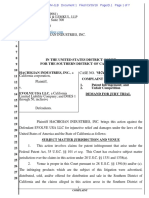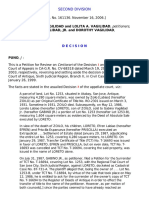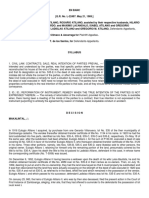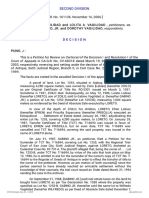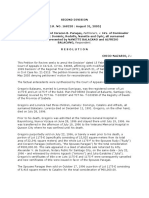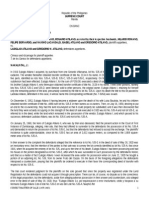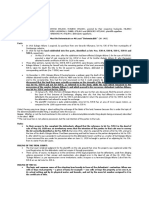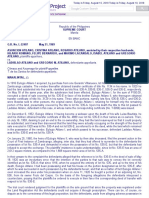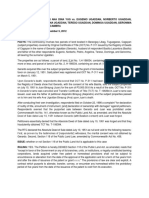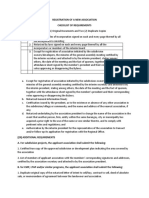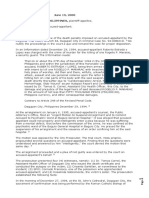Binayug vs. Ugaddan
Binayug vs. Ugaddan
Uploaded by
Xsche XscheCopyright:
Available Formats
Binayug vs. Ugaddan
Binayug vs. Ugaddan
Uploaded by
Xsche XscheOriginal Description:
Copyright
Available Formats
Share this document
Did you find this document useful?
Is this content inappropriate?
Copyright:
Available Formats
Binayug vs. Ugaddan
Binayug vs. Ugaddan
Uploaded by
Xsche XscheCopyright:
Available Formats
l\epulJUt of tbt tlbiltppint'
$;upremt :ourt
;fflanila
FIRST DIVISION
ALEJANDRO DINA YUG
ANA DINA YUG,
Petitioners,
and
G.R. No. 181623
Present:
- versus -
EUGENIO
UGADDAN,
NORBERTO
UGADDAN,
PEDRO
UGADDAN,
ANGELINA
UGADDAN,
TERESO
UGADDAN,
DOMINGA
UGADDAN,
GERONIMA UGADDAN, and
BASILIA LACAMBRA,
Respondents.
)(-
- -
----- --- - -- -
LEONARDO-DE CASTRO,
Acting Chairperson,
BERSAMIN,
VILLARAMA, JR.,
PEREZ, * and
REYES,JJ
Promulgated:
DEC 0 5 2012
..r
------ - ----- -- --- --- ---- - -DECISION
LEONARDO-DE CASTRO, J.:
This Petition for Review on Certiorari under Rule 45 of the Rules of
2
Court assails the Decision 1 dated August 6, 2007 and Order dated January
Per Special Order No. 1385 dated December 4, 2012.
Rollo, pp. 17-25; penned by Presiding Judge Lyliha L. Abella-Aquino.
Id. at 26.
DECISION
G.R. No. 181623
15, 2008 of the Regional Trial Court (RTC) of Tuguegarao City, Branch IV3
in Civil Case No. 5395.
At the crux of this controversy are two parcels of land located in
Barangay Libag, Tuguegarao, Cagayan (subject properties) covered by
Original Certificate of Title (OCT) No. P-311 issued by the Registry of
Deeds of Cagayan in the name of Gerardo Ugaddan (Gerardo), husband of
respondent Basilia Lacambra (Basilia) and father of the other respondents
Eugenio, Norberto, Pedro, Angelina, Tereso, Dominga, and Geronima, all
bearing the surname Ugaddan. OCT No. P-311 particularly described the
subject properties as follows:
A parcel of land, [L]ot No. 1,H-186034, containing an area of
31,682 sq.m., more or less; bounded on the North by public land on the
southeast, by lot 2 of plan H-186034 and lot 9556 of Tuguegarao
Cadastre; on the south by public land and on the southwest by Cagayan
River;
A parcel of land of Lot No. 2, H-186034, containing an area of
(1,723) sq.m., more or less. Bounded on the N., by Lot 9546 of
Tuguegarao Cadastre; on the E., by Lot 9556; and on the SW., by Lot 1 of
plan H-186034.4
Gerardo acquired title over the subject properties through the grant of
Homestead Patent No. V-6269 in his favor on January 12, 1951. Said patent
was registered and OCT No. P-311 was issued in Gerardos name on March
5, 1951.5
Upon Gerardos death, respondents discovered that OCT No. P-311
had been cancelled.
The records of the Registry of Deeds show that
Gerardo, with the consent of his wife Basilia, sold the subject properties on
July 10, 1951 to Juan Binayug (Juan) for the sum of P3,000.00.6 As a result
3
4
5
6
Designated as a Family Court.
Rollo, p. 17.
Records, pp. 9-10.
Id. at 22.
DECISION
G.R. No. 181623
of the sale, OCT No. P-311 in Gerardos name was cancelled and Transfer
Certificate of Title (TCT) No. T-106394 in Juans name was issued. Juan
was the father of petitioner Alejandro Binayug (Alejandro) and the subject
properties passed on to him and his wife Ana Ugaddan Binayug (Ana) upon
Juans death.
After conducting their own investigation, respondents filed on
October 22, 1998 a complaint for declaration of nullity of title, annulment
of instrument, [and] declaration of ownership with damages against
petitioners. Respondents averred that the purported sale between Gerardo
and Juan was prohibited under Commonwealth Act No. 141, otherwise
known as the Public Land Act, as amended; and that the Absolute Deed of
Sale dated July 10, 1951 between Gerardo (with Basilias consent) and Juan
was forged. Respondents specifically alleged in their complaint7 that:
9.
The said deed of sale which led to the cancellation of OCT
No. P-311 in favor of Juan Binayug has been falsified as said Gerardo
Ugaddan and herein [respondent] Basilia Lacambra could legibly write
their names but the deed of sale presented to the Registry of Deeds of
Cagayan appears to have been thumbmarked;
10.
[Respondents] cannot recall any deed or instrument of sale
which was executed in favor of Juan Binayug in the year 1951,
particularly that deed of sale dated July 10, 1951, allegedly notarized by
Atty. Jose P. Carag under Doc. No. 100; Page No. 20; Book No. VII;
Series of 1951 x x x;
11.
The affixed [thumbmark] above the name of [respondent]
Basilia Lacambra is a forgery as shown in the Technical Investigation/
Identification Report FP Case No. 98-347 of the National Bureau of
Investigation [NBI], Manila x x x;
12.
OCT No. P-311 having been issued pursuant to a
homestead patent cannot be alienated, transferred or conveyed after five
(5) years and before twenty-five (25) years next following the issuance
thereof in the year 1951, without the approval of the Secretary of
Agriculture and Natural Resources x x x as annotated at the back of the
same, x x x;
Id. at 1-6.
DECISION
G.R. No. 181623
13.
On April 8, 1997, without any legal personality or right,
[petitioner] Ana Ugaddan executed a Confirmation of Sale concerning
said lots embraced under [OCT No.] P-311, stating thereat that she is a
surviving heir of the deceased Gerardo Ugaddan which is a falsehood as
she is not related in any manner to the deceased Gerardo Ugaddan, save
for the same family name, Ugaddan, x x x;
14.
Earlier in November 11, 1996, [petitioner] Ana Ugaddan
filed a notice of loss of OCT No. P-311 with the Register of Deeds of
Cagayan stating among others that the original duplicate copy of OCT No.
P-311 was lost while in her possession, x x x;
15.
Thereafter, [petitioner] Ana Ugadan petitioned for the
issuance of another owners copy of OCT No. P-311 which ultimately led
to the issuance of TCT No. T-106394 in the name of Juan Binayug,
deceased father of [petitioner] Alejandro Binayug;
16.
The original owners duplicate copy of OCT No. P-311 was
never lost as the same has been and is still in the possession of
[respondent] Basilia Lacambra, hence the manner by which [petitioners]
caused the transfer of title in the name of Juan Binayug was a fraud[.]8
Hence, respondents asserted that TCT No. T-106394 in Juans name
was void for having been obtained through fraudulent means.
Petitioners essentially denied that the Absolute Deed of Sale dated
July 10, 1951 was forged and that they fraudulently obtained TCT No. T106394. Petitioners Answer9 contained the following averments:
3.
x x x that, the [respondents], except Geronima Ugaddan
and Basilia Lacambra, are tenants over the parcels of land covered by TCT
No. T-106394; that due to the failure of the said [respondents] to pay the
agreed lease rentals, the herein [petitioners] were constrained to file an
action against them at the [Department of Agrarian Reform Adjudication
Board] x x x;
xxxx
8.
That [respondent] Ana Ugaddan reported the loss of the
owners duplicate copy of OCT No. P-311 because when [respondents]
demanded from Basilia Lacambra and her children the surrender of the
said title so that [the] deed of sale in favor of Juan Binayug could be
8
9
Id. at 2-3.
Id. at 18-21.
DECISION
G.R. No. 181623
registered, they told said [petitioner] that it was lost, and when asked to
sign an affidavit of loss, they also refused to do so;
xxxx
10.
That if the owners duplicate copy of said OCT No. P-311
was not actually lost, then said Basilia Lacambra and her children have
only themselves to blame if the loss was reported by said Ana Ugaddan
because, as above stated, when the [petitioners] demanded the surrender to
them of the said title, Basilia Lacambra and her children, told them that it
was lost;
xxxx
12.
That after [respondents] predecessor-in-interest had
already long sold the subject property to [petitioners] predecessor-ininterest, the former have no more existing legal rights over the same which
is one of the requisites before an injunction can be issued[.]10
During trial on the merits, respondents submitted, among other pieces
of evidence, Technical Investigation/Identification Report FP Case No. 98347 dated September 28, 1998 of the National Bureau of Investigation (NBI)
to prove their allegation of fraud. According to the NBI, the thumbmark
found in the original and duplicate original Absolute Deed of Sale dated July
10, 1951 did not match the specimen obtained from respondent Basilia.11
The RTC rendered a Decision on August 6, 2007.
The RTC found that petitioners have been in possession of the subject
properties for some time now.
Petitioners were able to support their
testimonies with tax declarations and official receipts, proving that they and
their predecessor-in-interest have been paying real property tax on the
subject properties. In contrast, respondents failed to produce before the
court their own tax declaration for the subject properties despite being given
ample opportunity to do so; respondents merely claimed that said document
was already with their lawyer. The RTC also questioned how respondents
10
11
Id. at 18-19.
Id. at 8.
DECISION
G.R. No. 181623
could insist on having possession of the subject properties but they could not
even identify with certainty the boundaries of the same. Furthermore, the
RTC gave weight to the fact that petitioners filed against respondents an
agrarian case (based on allegations that respondents are agrarian tenants who
failed to pay their lease rentals) and an action for malicious mischief (based
on allegations that respondents destroyed the crops planted on the subject
properties). The RTC stated that [o]ne who firmly believes to be the owner
of a property is expected to protect it from intruders and necessarily avail of
the legal remedies to defend his rights.12 Admittedly, respondents were
acquitted of the criminal charge for malicious mischief, but the RTC herein
stressed that the acquittal was because respondents guilt was not proven
beyond reasonable doubt and not because respondents did not at all commit
the crime charged. Hence, the RTC was convinced that the Absolute Deed
of Sale dated July 10, 1951 was genuine and in existence, actually executed
by Gerardo in favor of Juan.
Despite its foregoing findings, the RTC pronounced that it did not
necessarily follow that the Absolute Deed of Sale dated July 10, 1951 was
valid or legal. In fact, the RTC expressly declared that said Deed suffered
from legal infirmities.
The RTC determined that respondent Basilia did not actually give her
consent to and affix her thumbmark on said Absolute Deed of Sale, to wit:
The first witness presented by the [respondents] is Jose Palma, an
employee of the Dactyloscopic Division of the National Bureau of
Investigation. He testified that in his examinations, the [thumbmark] of
Basilia Lacambra in the purported deed of sale is different from her
standard fingerprint. This finding was not refuted by the [petitioners].
Instead, they pointed their argument that the [thumbmark] of Gerardo is
genuine and likewise affixed his [thumbmark] on the questioned deed of
sale and it is placed a little bit above the name of Basilia. [Petitioners]
12
Rollo, p. 21.
DECISION
G.R. No. 181623
theory in a nutshell is that, Gerardo laid his thumbmarks on both his name
and of Basilia. They however presented no evidence to prove this
contention. At best, it is merely surmises. The court sees no reason either
why Gerardo would utilize his own [thumbmark] in lieu of his wife[s]. If
the [petitioners] claim that spouses Gerardo and Basilia were alive when
the supposed deed of sale was executed, then it is presumed that both
assented to the conveyance of the contested lots absent of any indication
that it was only Gerardo who participated. But having found that the
[thumbmark] of Basilia is spurious, the genuineness and authenticity of
the deed of sale become suspect.
The findings of witness-Palma is bolstered by the testimony of
Guillermo Casagan when he testified that Basilia knows how to write
instead of resorting to her [thumbmarks] on documents:
ATTY. MARTIN
xxxx
Q- Do you know whether or not Basilia Ladambra has the ability
to write?
A- Yes sir. She knows how to write.
Q- Why do you know that she can write?
A- I know that she knows how to write because she had a store
before and I have often seen her write.
Q- Mr. witness, how old were you in the year 1951?
A- Thirteen years old, sir.
xxxx
In his cross-examination, his declaration on this subject was not
touched by the [petitioners] counsel. In light of this factual milieu, the
court finds that the thumbprint of Basilia Lacambra in the Absolute Deed
of Sale dated July 10, 1951 is not her own. There is no dispute that
Gerardo and Basilia were married. Thus, there is hardly any reason to
reject that the homestead property is conjugal [in] nature. And since no
consent was given by Basilia in the alleged transfer, it necessarily follows
that the document has no force and effect.13
The RTC then declared the Absolute Deed of Sale dated July 10, 1951
as null and void for the following reasons:
13
Id. at 19-20.
DECISION
G.R. No. 181623
First, as proven by the testimonies of [respondents] witnesses, the
marital consent was not obtained by Gerardo.
Second, Section 118 of the Public Land Law, amended by
Commonwealth Act No. 456, reads as follows:
Section 118. Except in favor of the Government or any of its
branches, units, or institutions, lands acquired under free patent or
homestead provisions shall not be subject to encumbrance or
alienation from the date of the approval of the application and for a
term of five years from and after the date of issuance of the patent
or grant, nor shall they become liable to the satisfaction of any debt
contracted prior to the expiration of said period, but the
improvements or crops on the land may be mortgaged or pledged
to qualified persons, associations, or corporations.
No alienation, transfer, or conveyance of any homestead after
five and before twenty-five years after issuance of title shall be
valid without the approval of the Secretary of Agriculture and
Natural Resources, which approval shall be denied except on
constitutional and legal grounds.
On the basis of the afore-quoted section, a homestead patent
cannot be alienated or encumbered within five (5) years from the approval
of application except in favor of the government or any of its branches or
institutions. Where a homestead was sold during the prohibited period,
even if the sale is approved by the Director of Lands subsequently after
five (5) years, the approval will not give it any valid curative effect. Such
sale is illegal, inexistent, and null and void ab initio. The action to declare
the existence of such contract will not prescribe. As a matter of fact, the
vendor never lost his title or ownership over the homestead, and there
is no need for him or his heirs to repurchase the same from the
vendee, or for the latter to execute a deed of reconveyance. Of course,
the purchaser may recover the price which he has paid, and where the
homesteader vendor died, the recovery may be pursued as a claim filed
against his estate in the corresponding proceeding.
[Petitioners] do not deny that the contested lots were originally
covered by a homestead patent. It then behooves on their part to prove
that the purported deed of sale was executed outside the five-year
prohibitory period. Failure to do so, the court has no choice but to declare
null and void the deed of sale executed by spouses Gerardo and Basilia in
favor of Juan Binayug.
Evident from the records is that the issuance of the Patent was on
12 January 1951. The registration thereof to the Register of Deeds was on
5 March 1951 and the supposed deed of sale was executed on July 10,
1951. From the pleadings and testimonies of [petitioners] and their
witness, none can be carved out from them that the sale was beyond the
prohibitory period. In fact, they seemed to have evaded this issue.
DECISION
G.R. No. 181623
Coupled in considering the relevant months in the year 1951, months
which are too close to shield [petitioners] from Section 118, this court can
only conclude that even if it is to presume the genuineness of the deed of
sale, the conveyance is void as it falls within the period of five (5) years.
Thus, the title obtained by the vendee-Juan Binayug, is also null and void
ab initio. So also, where a homestead was sold during the prohibitory
period of five years and upon the expiration of said period a new deed of
sale was executed[,] such as a mere reproduction of the previous one, it
was held that the latter deed of sale was invalid as the prior deed which
intended to ratify. For the purpose of declaring such sale null and void,
neither laches nor prescription can operate for the action is
imprescriptible.14 (Citations omitted.)
The RTC, however, recognized petitioners good faith and did not
leave them empty handed, to wit:
This court is convinced that [petitioners] firmly believe in good
faith that the land is theirs when they took over from their parents. It
however agonizes over the fact that the law is against them as their
forebears ignorance of the law has finally caught them. Of course all [is
not] lost. Even [if] we are to declare the sale as invalid, they can recover
the price on the basis of the cited jurisprudence. Considering that the sale
was consummated in 1951, it is beyond the sphere of competence of
anybody to know the price. The court will then grant a reasonable amount
of P100,000 for the Thirty-Three Thousand Four-hundred Five (33,405)
square meters of land.15
Ultimately, the RTC decreed thus:
WHEREFORE, premises considered, Transfer Certificate of
Title No. T-106394 issued in the name of Juan Binayug is declared null
and void and is hereby ordered cancelled. Original Certificate of Title
No. P-311 in the name of Gerardo Ugaddan is declared still subsisting
and valid. The Register of Deeds of the Province of Cagayan is hereby
directed to cause the necessary annotations thereof. [Respondents are]
hereby ordered to pay [petitioners] P100,000.00 as payment for the price
of lots. For lack of merit, the claim for other damages is hereby
dismissed.16
14
15
16
Id. at 22-24.
Id. at 24-25.
Id. at 25.
DECISION
10
G.R. No. 181623
Petitioners filed a Motion for Reconsideration of the aforementioned
RTC judgment arguing that the trial court contradicted itself in finding that
the Absolute Deed of Sale dated July 10, 1951 is genuine and in existence,
then nullifying TCT No. T-106394 in Juans name. Petitioners likewise
asserted that a Torrens title such as TCT No. T-106394 is not susceptible to
collateral attack.
In an Order dated January 15, 2008, the RTC denied petitioners
Motion for Reconsideration due to lack of substantial argument.
Aggrieved, petitioners immediately resorted to this Court by filing the
instant Petition under Rule 45 of the Rules of Court, which presented a lone
assignment of error:
THE HONORABLE REGIONAL TRIAL COURT BRANCH IV OF
TUGUEGARAO CITY GRAVELY ERRED IN APPLYING THE
PROVISION OF SECTION 118 OF THE PUBLIC LAND ACT
INSTEAD OF APPLYING THE PROVISION OF SECTION 124 OF
THE SAME LAW.17
Before discussing the merits of the case, the Court notes that
petitioners no longer appealed the RTC judgment before the Court of
Appeals, going directly before this Court through a Petition for Review on
Certiorari under Rule 45 of the Rules of Court.
According to Rule 41, Section 2(c)18 of the Rules of Court, a decision
or order of the RTC may be appealed to the Supreme Court by petition for
review on certiorari under Rule 45, provided that such petition raises only
17
18
Id. at 10.
Section 2. Modes of Appeal. x x x (c) Appeal by certiorari.In all cases where only questions of
law are raised or involved, the appeal shall be to the Supreme Court by petition for review on
certiorari in accordance with Rule 45.
DECISION
11
G.R. No. 181623
questions of law.19 A question of law exists when the doubt or controversy
concerns the correct application of law or jurisprudence to a certain set of
facts; or when the issue does not call for an examination of the probative
value of the evidence presented, the truth or falsehood of facts being
admitted. A question of fact exists when the doubt or difference arises as to
the truth or falsehood of facts or when the query invites calibration of the
whole evidence considering mainly the credibility of the witnesses, the
existence and relevancy of specific surrounding circumstances, as well as
their relation to each other and to the whole, and the probability of the
situation.20
Petitioners raise and argue only one issue in their Petition: whether or
not Section 118 of the Public Land Act is applicable to their case. They no
longer challenge the appreciation of evidence and factual conclusions of the
RTC. Consequently, petitioners resort directly to this Court via the instant
Petition for Review on Certiorari is in accordance with procedural rules.
Nonetheless, the Court finds no merit in the Petition and denies the
same.
To reiterate, Section 118 of the Public Land Act, as amended, reads
that [e]xcept in favor of the Government or any of its branches, units, or
institutions, or legally constituted banking corporations, lands acquired
under free patent or homestead provisions shall not be subject to
encumbrance or alienation from the date of the approval of the application
19
20
Section 1. Filing of petition with Supreme Court. A party desiring to appeal by certiorari from
a judgment, final order or resolution of the Court of Appeals, the Sandiganbayan, the Court of Tax
Appeals, the Regional Trial Court or other courts, whenever authorized by law, may file with the
Supreme Court a verified petition for review on certiorari. The petition may include an
application for a writ of preliminary injunction or other provisional remedies and shall raise only
questions of law, which must be distinctly set forth. The petitioner may seek the same provisional
remedies by verified motion filed in the same action or proceeding at any time during its
pendency.
Bukidnon Doctors Hospital, Inc. v. Metropolitan Bank and Trust Co., 501 Phil. 516, 526 (2005).
DECISION
12
G.R. No. 181623
and for a term of five years from and after the date of issuance of the patent
or grant x x x. The provisions of law are clear and explicit. A contract
which purports to alienate, transfer, convey, or encumber any homestead
within the prohibitory period of five years from the date of the issuance of
the patent is void from its execution. In a number of cases, this Court has
held that such provision is mandatory.21
In the present case, it is settled that Homestead Patent No. V-6269
was issued to Gerardo on January 12, 1951 and the Absolute Deed of Sale
between Gerardo and Juan was executed on July 10, 1951, after a lapse of
only six months. Irrefragably, the alienation of the subject properties took
place within the five-year prohibitory period under Section 118 of the Public
Land Act, as amended; and as such, the sale by Gerardo to Juan is null and
void right from the very start.22
As a void contract, the Absolute Deed of Sale dated July 10, 1951
produces no legal effect whatsoever in accordance with the principle quod
nullum est nullum producit effectum,23 thus, it could not have transferred
title to the subject properties from Gerardo to Juan and there could be no
basis for the issuance of TCT No. T-106394 in Juans name.
A void
contract is also not susceptible of ratification, and the action for the
declaration of the absolute nullity of such a contract is imprescriptible.24
Petitioners contend that only the State can bring action for violation of
Section 118 of the Public Land Act, as amended. Moreover, Section 124 of
the same Act explicitly provides for the consequence of such a violation:
21
22
23
24
Arsenal v. Intermediate Appellate Court, 227 Phil. 36, 45-46 (1986).
PVC Investment & Management Corporation v. Borcena, 507 Phil. 668, 680 (2005).
Heirs of Policronio M. Ureta, Sr. v. Heirs of Liberato M. Ureta, G.R. No. 165748, September 14,
2011, 657 SCRA 555, 580.
Id.
DECISION
13
G.R. No. 181623
Section 124. Any acquisition, conveyance, alienation, transfer, or
other contract made or executed in violation of any of the provisions of
Sections one hundred and eighteen, one hundred and twenty, one hundred
and twenty-one, one hundred and twenty-two, and one hundred and
twenty-three of this Act shall be unlawful and null and void from its
execution and shall produce the effect of annulling and cancelling the
grant, title, patent or permit originally issued, recognized or confirmed,
actually or presumptively, and cause the reversion of the property and its
improvement to the State.
Petitioners contentions are not novel.
In De los Santos v. Roman Catholic Church of Midsayap,25 a
homestead patent covering a tract of land in Midsayap, Cotabato was
granted to Julio Sarabillo (Sarabillo) on December 9, 1938. OCT No. RP269 was issued to Sarabillo on March 17, 1939. On December 31, 1940,
Sarabillo sold two hectares of land to the Roman Catholic Church of
Midsayap (Church). Upon Sarabillos death, Catalina de los Santos (De los
Santos) was appointed administratrix of his estate. In the course of her
administration, De los Santos discovered that Sarabillos sale of land to the
Church was in violation of Section 118 of the Public Land Act, prompting
her to file an action for the annulment of said sale. The Church raised as
defense Section 124 of the Public Land Act, as well as the principle of pari
delicto. The Court, in affirming the CFI judgment favoring De los Santos,
ratiocinated:
The principles thus invoked by [the Church, et al.] are correct and
cannot be disputed. They are recognized not only by our law but by our
jurisprudence. Section 124 of the Public Land Act indeed provides that
any acquisition, conveyance or transfer executed in violation of any of its
provisions shall be null and void and shall produce the effect of annulling
and cancelling the grant or patent and cause the reversion of the property
to the State, and the principle of pari delicto has been applied by this
Court in a number of cases wherein the parties to a transaction have
proven to be guilty of having effected the transaction with knowledge of
the cause of its invalidity. But we doubt if these principles can now be
invoked considering the philosophy and the policy behind the approval of
25
94 Phil. 405 (1954).
DECISION
14
G.R. No. 181623
the Public Land Act. The principle underlying pari delicto as known here
and in the United States is not absolute in its application. It recognizes
certain exceptions one of them being when its enforcement or application
runs counter to an avowed fundamental policy or to public interest. As
stated by us in the Rellosa case, This doctrine is subject to one important
limitation, namely, whenever public policy is considered advanced by
allowing either party to sue for relief against the transaction.
The case under consideration comes within the exception above
adverted to. Here [De Los Santos] desires to nullify a transaction which
was done in violation of the law. Ordinarily the principle of pari delicto
would apply to her because her predecessor-in-interest has carried out the
sale with the presumed knowledge of its illegality, but because the
subject of the transaction is a piece of public land, public policy
requires that she, as heir, be not prevented from re-acquiring it
because it was given by law to her family for her home and
cultivation. This is the policy on which our homestead law is
predicated. This right cannot be waived. It is not within the competence
of any citizen to barter away what public policy by law seeks to preserve.
We are, therefore, constrained to hold that [De Los Santos] can
maintain the present action it being in furtherance of this
fundamental aim of our homestead law.
As regards the contention that because the immediate effect of the
nullification of the sale is the reversion of the property to the State[, De
Los Santos] is not the proper party to institute it but the State itself, that is
a point which we do not have, and do not propose, to decide. That is a
matter between the State and the Grantee of the homestead, or his heirs.
What is important to consider now is who of the parties is the better
entitled to the possession of the land while the government does not
take steps to assert its title to the homestead. Upon annulment of the
sale, the purchasers claim is reduced to the purchase price and its
interest. As against the vendor or his heirs, the purchaser is no more
entitled to keep the land than any intruder. Such is the situation of the
[the Church, et al.]. Their right to remain in possession of the land is no
better than that of [De Los Santos] and, therefore, they should not be
allowed to remain in it to the prejudice of [De Los Santos] during and until
the government takes steps toward its reversion to the State.26 (Emphases
supplied, citations omitted.)
In Arsenal v. Intermediate Appellate Court,27 the Court adjudged that
in cases where the homestead has been the subject of void conveyances, the
law still regards the original owner as the rightful owner subject to escheat
proceedings by the State. Still in Arsenal, the Court referred to Menil v.
26
27
Id. at 410-412.
Supra note 21 at 51.
DECISION
15
G.R. No. 181623
Court of Appeals28 and Manzano v. Ocampo,29 wherein the land was
awarded back to the original owner notwithstanding the fact that he was
equally guilty with the vendee in circumventing the law.
Jurisprudence, therefore, supports the return of the subject properties
to respondents as Gerardos heirs following the declaration that the Absolute
Deed of Sale dated July 10, 1951 between Gerardo and Juan is void for
being in violation of Section 118 of the Public Land Act, as amended. That
the subject properties should revert to the State under Section 124 of the
Public Land Act, as amended, is a non-issue, the State not even being a party
herein.
As a final note, although not assigned as an error in their Petition,
petitioners raise as an issue and argue extensively in their Memorandum that
they had acquired acquisitive prescription over the subject properties. The
issue of prescription involves questions of fact, i.e., when and for how long
petitioners have possessed the subject properties and whether their
possession is open, continuous, exclusive, notorious, and adverse.
The
RTCs findings that petitioners and their predecessor-in-interest have been in
possession of the subject properties for quite some time now or through
the years are clearly insufficient. To resolve the issue of prescription, the
Court must necessarily go through the evidence presented by the parties,
which it cannot do. This Court is not a trier of facts. To reiterate, the Court
only allowed petitioners to come directly before this Court from the RTC
through the instant Petition because they raise a pure question of law,
namely, the applicability of Sections 118 and 124 of the Public Land Act, as
amended. The Court cannot take cognizance of the issue of acquisitive
prescription.
28
29
173 Phil. 584 (1978).
111 Phil. 283 (1961).
16
DECISION
G.R. No. 181623
WHEREFORE, the Petition is hereby DENIED. The Decision dated
August 6, 2007 and Order dated January 15, 2008 of the Regional Trial
Court of Tuguegarao City, Branch IV in Civil Case No. 5395 are hereby
AFFIRMED.
Costs against petitioners.
SO ORDERED.
~~~~
TERESITA J. LEONARDO-DE CASTRO
Associate Justice
Acting Chairperson, First Division
WECONCUR:
EZ
BIENVENIDO L. REYES
Associate Justice
DECISION
17
G.R. No. 181623
ATTESTATION
I attest that the conclusions in the above Decision had been reached in
consultation before the case was assigned to the writer of the opinion of the
Court's Division.
~~b~
TERESITA J. LEONARDO-DE CASTRO
Associate Justice
Acting Chairperson, First Division
CERTIFICATION
Pursuant to Section 13, Article VIII of the Constitution and the
Division Acting Chairperson's Attestation, I certify that the conclusions in
the above Decision had been reached in consultation before the case was
assigned to the writer of the opinion of the Court's Division.
ANTONIO T. CARPIO
Senior Associate Justice
(Per Section 12, R.A. 296,
The Judiciary Act of 1948, as amended)
You might also like
- Affidavit - Lost PassportDocument1 pageAffidavit - Lost PassportTina Nduba-BanjaNo ratings yet
- Petition To Consolidate SubdivideDocument3 pagesPetition To Consolidate SubdivideXsche XscheNo ratings yet
- VAWC PetitionDocument8 pagesVAWC Petitionervin sabarre80% (5)
- Affidavit of Cancellation of Subdivision PlanDocument1 pageAffidavit of Cancellation of Subdivision PlanXsche Xsche100% (3)
- Hachigian Industries Inc. v. Evolve USA - ComplaintDocument22 pagesHachigian Industries Inc. v. Evolve USA - ComplaintSarah BursteinNo ratings yet
- NOE TOLEDO y TAMBOONG, Petitioner, vs. PEOPLE OF THE PHILIPPINES, Respondent. G.R. No.158057 - September 24, 2004Document2 pagesNOE TOLEDO y TAMBOONG, Petitioner, vs. PEOPLE OF THE PHILIPPINES, Respondent. G.R. No.158057 - September 24, 2004Ree EneNo ratings yet
- 02 Vagilidad Vs VagilidadDocument13 pages02 Vagilidad Vs VagilidadXyrus BucaoNo ratings yet
- Vagilidad v. VagilidadDocument5 pagesVagilidad v. VagilidadPatrick Jorge SibayanNo ratings yet
- Land Tits 3rd BatchDocument57 pagesLand Tits 3rd BatchKyle CroodsNo ratings yet
- GR No 161136Document7 pagesGR No 161136Kimberly Mae GalletaNo ratings yet
- Sales Wave 1Document26 pagesSales Wave 1Ronald LasinNo ratings yet
- Sales Wave 1Document14 pagesSales Wave 1Ronald LasinNo ratings yet
- Antichresis CasesDocument8 pagesAntichresis Casespau.au mendozaNo ratings yet
- 2 Atilano v. Atilano20160217-9815-1tvpiapDocument3 pages2 Atilano v. Atilano20160217-9815-1tvpiapAiyla AnonasNo ratings yet
- Vagilidad V Vagilidad (2006)Document13 pagesVagilidad V Vagilidad (2006)J.N.No ratings yet
- Petitioners Vs Vs Respondents: Second DivisionDocument11 pagesPetitioners Vs Vs Respondents: Second DivisionRea Rose TampusNo ratings yet
- Heirs of Jugalbot V CADocument23 pagesHeirs of Jugalbot V CAMp CasNo ratings yet
- Paragas Vs Heirs of DomingoDocument10 pagesParagas Vs Heirs of Domingoermeline tampusNo ratings yet
- Francisco v. Francisco-Alfonso, G.R. No. 138774, (March 8, 2001), 406 PHIL 556-565)Document6 pagesFrancisco v. Francisco-Alfonso, G.R. No. 138774, (March 8, 2001), 406 PHIL 556-565)yasuren2No ratings yet
- Land Titles CasesDocument26 pagesLand Titles CasesSui Ge NerisNo ratings yet
- Quitain CD10Document64 pagesQuitain CD10Bogs QuitainNo ratings yet
- 5 Heirs of Bagaygay v. Heirs of Paciente, G.R. No. 212126, Aug. 4, 2021Document7 pages5 Heirs of Bagaygay v. Heirs of Paciente, G.R. No. 212126, Aug. 4, 2021Aisaia Jay ToralNo ratings yet
- Heirs of Demetria Lacsa vs. Court of Appeals: - Second DivisionDocument13 pagesHeirs of Demetria Lacsa vs. Court of Appeals: - Second DivisionJuris PasionNo ratings yet
- Republic V CA 301 SCRA 366 - Full TextDocument9 pagesRepublic V CA 301 SCRA 366 - Full TextLulu RodriguezNo ratings yet
- Sps. Salvador and Leonida M. Bangug and Sps. Venerandy Adolfo and Jesusa Adolfo vs. George Dela CruzDocument12 pagesSps. Salvador and Leonida M. Bangug and Sps. Venerandy Adolfo and Jesusa Adolfo vs. George Dela Cruzlyonnelsaragon3008No ratings yet
- Rep of The Phils Vs Agunoy SR - 155394 - February 17, 2005 - JDocument9 pagesRep of The Phils Vs Agunoy SR - 155394 - February 17, 2005 - JPatNo ratings yet
- Sideco V Aznar 92 Phil 952Document5 pagesSideco V Aznar 92 Phil 952LASNo ratings yet
- Butiong v. PlazoDocument13 pagesButiong v. PlazoNikNo ratings yet
- Heirs of Gregorio Tengco Vs Vs Heirs of Jose AliwalasDocument4 pagesHeirs of Gregorio Tengco Vs Vs Heirs of Jose AliwalasSolomon Malinias BugatanNo ratings yet
- 08-Justalero Vs GonzalesDocument8 pages08-Justalero Vs GonzalesthelawanditscomplexitiesNo ratings yet
- Petitioner Vs Vs Respondents Pedro P. Tuason Isaiah AsuncionDocument5 pagesPetitioner Vs Vs Respondents Pedro P. Tuason Isaiah AsuncionNika RojasNo ratings yet
- Republic vs. Agunoy GR No. 155394 Feb. 17, 2005Document13 pagesRepublic vs. Agunoy GR No. 155394 Feb. 17, 2005Marco ArponNo ratings yet
- Cureg vs. Intermediate Appellate Court 177 SCRA 313, September 07, 1989Document11 pagesCureg vs. Intermediate Appellate Court 177 SCRA 313, September 07, 1989juan dela cruzNo ratings yet
- Vagilidad V VagilidadDocument13 pagesVagilidad V VagilidadJMae MagatNo ratings yet
- Francisco v. Francisco-AlfonsoDocument6 pagesFrancisco v. Francisco-AlfonsoCharmaine MejiaNo ratings yet
- Subject Matter of Sale Full Text CasesDocument19 pagesSubject Matter of Sale Full Text CasesMelody0312No ratings yet
- L&Epublic of Tbe Tlbilippines Jelanila: (!courtDocument7 pagesL&Epublic of Tbe Tlbilippines Jelanila: (!courtpatricia.aniyaNo ratings yet
- Climaco and Azcarraga For Plaintiff-Appellee. T. de Los Santos For Defendants-AppellantsDocument3 pagesClimaco and Azcarraga For Plaintiff-Appellee. T. de Los Santos For Defendants-AppellantsJL GENNo ratings yet
- Atilano v. AtilanoDocument2 pagesAtilano v. AtilanokookNo ratings yet
- Full Text Cadastral and Administrative Issuance of Patents To Subsequent RegDocument96 pagesFull Text Cadastral and Administrative Issuance of Patents To Subsequent RegJamie VodNo ratings yet
- Sales Part IIDocument47 pagesSales Part IIRonald LasinNo ratings yet
- Atilano v. Atilano, G.R. No. L-22487 May 21, 1969Document2 pagesAtilano v. Atilano, G.R. No. L-22487 May 21, 1969jbjacildoNo ratings yet
- (Petitioner's Herein) Re-Constituted Transfer Certificate of Title RT-6293 (No. 23350) As Null and Void (Record On AppealDocument5 pages(Petitioner's Herein) Re-Constituted Transfer Certificate of Title RT-6293 (No. 23350) As Null and Void (Record On AppealJosie Jones BercesNo ratings yet
- 12 - Heirs of Tengco VS Heirs of AliwalasDocument4 pages12 - Heirs of Tengco VS Heirs of AliwalasDi ko alamNo ratings yet
- Heirs of Tengco Vs Heirs of AliwalasDocument5 pagesHeirs of Tengco Vs Heirs of AliwalasCharry CastillonNo ratings yet
- CD10Document101 pagesCD10Badette Lou R. Katigbak - LasinNo ratings yet
- 51-54 Digested CasesDocument5 pages51-54 Digested CasesRodel Acson AguinaldoNo ratings yet
- JurisprudenceDocument61 pagesJurisprudencejaine0305No ratings yet
- 10 Paragas v. BalacanoDocument11 pages10 Paragas v. BalacanoApa MendozaNo ratings yet
- Atilano Vs AtilanoDocument2 pagesAtilano Vs AtilanoMaribel Nicole LopezNo ratings yet
- Alejandro Dinayug and Ana Dina Yug VsDocument2 pagesAlejandro Dinayug and Ana Dina Yug VsbberaquitNo ratings yet
- G.R. No. 138774 March 8, 2001 Regina Francisco and Zenaida PASCUAL, Petitioners, Aida Francisco-ALFONSO, Respondent. Pardo, J.Document12 pagesG.R. No. 138774 March 8, 2001 Regina Francisco and Zenaida PASCUAL, Petitioners, Aida Francisco-ALFONSO, Respondent. Pardo, J.JuralexNo ratings yet
- Vagilidad Vs VagilidadDocument12 pagesVagilidad Vs VagilidadLelouch LamperNo ratings yet
- Kings Properties v. Galido Bad FaithDocument27 pagesKings Properties v. Galido Bad FaithAngel EiliseNo ratings yet
- Vagilidad Vs Vagilidad PDFDocument3 pagesVagilidad Vs Vagilidad PDFAvilopezNo ratings yet
- PD 1529 Assurane Fund CasesDocument52 pagesPD 1529 Assurane Fund CasesGracey Sagario Dela TorreNo ratings yet
- Velarde Aninang Cd9Document64 pagesVelarde Aninang Cd9jacquelynvelardeNo ratings yet
- 2 Arradaza Vs CA & LarrazabalDocument5 pages2 Arradaza Vs CA & LarrazabalCharm Divina LascotaNo ratings yet
- Butiong vs. Plazo, 765 SCRA 227Document16 pagesButiong vs. Plazo, 765 SCRA 227dondzNo ratings yet
- Serviliano Ibarra and Menadro Quioje For Appellants. Antonio T. Carrascoso, JR., For AppelleesDocument3 pagesServiliano Ibarra and Menadro Quioje For Appellants. Antonio T. Carrascoso, JR., For AppelleesAndree MorañaNo ratings yet
- Arradaza Et Al. v. CA Larrazabal GR 50422 Feb. 8 1989Document8 pagesArradaza Et Al. v. CA Larrazabal GR 50422 Feb. 8 1989Val Justin DeatrasNo ratings yet
- Abad v. Heirs of Gallardo, G.R. No. 229070, 10 November 2020Document9 pagesAbad v. Heirs of Gallardo, G.R. No. 229070, 10 November 2020Raphael Antonio PunzalanNo ratings yet
- The Diplomatic Correspondence of the American Revolution, Vol. VIIIFrom EverandThe Diplomatic Correspondence of the American Revolution, Vol. VIIINo ratings yet
- Report of the Decision of the Supreme Court of the United States, and the Opinions of the Judges Thereof, in the Case of Dred Scott versus John F.A. Sandford December Term, 1856.From EverandReport of the Decision of the Supreme Court of the United States, and the Opinions of the Judges Thereof, in the Case of Dred Scott versus John F.A. Sandford December Term, 1856.No ratings yet
- Petition for Certiorari – Patent Case 99-396 - Federal Rule of Civil Procedure 12(h)(3) Patent Assignment Statute 35 USC 261From EverandPetition for Certiorari – Patent Case 99-396 - Federal Rule of Civil Procedure 12(h)(3) Patent Assignment Statute 35 USC 261No ratings yet
- LOT 1: A LEGAL DECRIPTION OF JUDICIAL CORRUPTION IN COOK COUNTY, ILLINOIS COOK COUNTY PARCEL NUMBERS ARE NOT LOT NUMBERSFrom EverandLOT 1: A LEGAL DECRIPTION OF JUDICIAL CORRUPTION IN COOK COUNTY, ILLINOIS COOK COUNTY PARCEL NUMBERS ARE NOT LOT NUMBERSNo ratings yet
- Board Resolution-Affiliation-Capok Village HOA, Inc.Document2 pagesBoard Resolution-Affiliation-Capok Village HOA, Inc.Xsche XscheNo ratings yet
- Board Resoution Affiliation Km.4Document2 pagesBoard Resoution Affiliation Km.4Xsche XscheNo ratings yet
- Amendment To Deed of Sale of PortionDocument1 pageAmendment To Deed of Sale of PortionXsche XscheNo ratings yet
- Petition To Split TigmoDocument1 pagePetition To Split TigmoXsche XscheNo ratings yet
- Draft Guidelines For Issuance of HOA Consent or Clearance For TelcosDocument10 pagesDraft Guidelines For Issuance of HOA Consent or Clearance For TelcosXsche XscheNo ratings yet
- T 123987Document4 pagesT 123987Xsche XscheNo ratings yet
- Checklist of RequirementsDocument3 pagesChecklist of RequirementsXsche XscheNo ratings yet
- Affidavit of Lost SepiaDocument1 pageAffidavit of Lost SepiaXsche XscheNo ratings yet
- Acknowledgement Receipt-Charlie DimasuayDocument1 pageAcknowledgement Receipt-Charlie DimasuayXsche XscheNo ratings yet
- 2001-2030 National Framework For Physical Planning SumDocument1 page2001-2030 National Framework For Physical Planning SumXsche XscheNo ratings yet
- Hoa Amendment ApplicationDocument1 pageHoa Amendment ApplicationXsche Xsche100% (1)
- DEED OF ABSOLUTE SALE - Jason - LatestDocument6 pagesDEED OF ABSOLUTE SALE - Jason - LatestXsche XscheNo ratings yet
- Martin vs. RevillaDocument4 pagesMartin vs. RevillaXsche XscheNo ratings yet
- Talavera Vs TabuDocument12 pagesTalavera Vs TabuXsche XscheNo ratings yet
- US vs. Guendia - InsanityDocument13 pagesUS vs. Guendia - Insanityalwayskeepthefaith8No ratings yet
- Paper I PPDocument3 pagesPaper I PPlegallyindiaNo ratings yet
- Green Star Express Inc. vs. Nissin Universal Robina Corporaton 761 SCRA 528 July 06 2015Document9 pagesGreen Star Express Inc. vs. Nissin Universal Robina Corporaton 761 SCRA 528 July 06 2015Nestor Jr. FariolanNo ratings yet
- 128928-1992-Pico v. Combong Jr.Document4 pages128928-1992-Pico v. Combong Jr.Caryssa Therese C. VerzosaNo ratings yet
- Roger V NadalDocument9 pagesRoger V NadalClement del RosarioNo ratings yet
- Manila Mandarin Employees Union vs. NLRC, G. R. No. 76989, Sept. 29, 1987Document8 pagesManila Mandarin Employees Union vs. NLRC, G. R. No. 76989, Sept. 29, 1987jonbelzaNo ratings yet
- Carbonell V CA, GR L-29972, January 26, 1976 (Per J. Makasiar, First Division)Document3 pagesCarbonell V CA, GR L-29972, January 26, 1976 (Per J. Makasiar, First Division)Steve UyNo ratings yet
- Goss v. Beilfuss Et Al - Document No. 8Document3 pagesGoss v. Beilfuss Et Al - Document No. 8Justia.comNo ratings yet
- Chapter 189-The Stamp Duty Act PDFDocument92 pagesChapter 189-The Stamp Duty Act PDFEsther Maugo100% (2)
- Injury To AliensDocument30 pagesInjury To AliensMamatha RangaswamyNo ratings yet
- Your Contractual Questions Answered.: Entrusty Group, A Multi-Displinary Group of Companies, of Which, One of TheirDocument3 pagesYour Contractual Questions Answered.: Entrusty Group, A Multi-Displinary Group of Companies, of Which, One of TheirUzair MNNo ratings yet
- Armigos vs. CA - DigestDocument1 pageArmigos vs. CA - DigestRonn Petitt100% (1)
- Chua-Qua Vs ClaveDocument2 pagesChua-Qua Vs ClaveCheryl Churl100% (1)
- Casar Vs Soluren DigestDocument1 pageCasar Vs Soluren DigestilovetwentyonepilotsNo ratings yet
- Freedom of ServicesDocument3 pagesFreedom of ServicesJoey WongNo ratings yet
- United States Court of Appeals, Third CircuitDocument23 pagesUnited States Court of Appeals, Third CircuitScribd Government DocsNo ratings yet
- Working Hours & Over TimeDocument8 pagesWorking Hours & Over TimeshannabyNo ratings yet
- Grounds of AppealDocument13 pagesGrounds of AppealIR Tribunal - vexatious 2100% (1)
- Some Forestry CasesDocument19 pagesSome Forestry CasesRose SabadoNo ratings yet
- United States v. Anthony Bruno, Angelo Cerasulo, John Imbrieco, Mario Fortunato and Carmine Polito, 383 F.3d 65, 2d Cir. (2004)Document30 pagesUnited States v. Anthony Bruno, Angelo Cerasulo, John Imbrieco, Mario Fortunato and Carmine Polito, 383 F.3d 65, 2d Cir. (2004)Scribd Government DocsNo ratings yet
- Industrial Sand and Gravel Permits (26 October 2018)Document6 pagesIndustrial Sand and Gravel Permits (26 October 2018)Gelo MV100% (2)
- PFIZER Vs VelascoDocument1 pagePFIZER Vs VelascoCeresjudicataNo ratings yet
- Document 6Document5 pagesDocument 6KaranBelongsToU100% (1)
- EYAL VOLKMAR Et Al v. BRP USA INC ComplaintDocument47 pagesEYAL VOLKMAR Et Al v. BRP USA INC ComplaintbombardierwatchNo ratings yet
- LTD Module 6Document6 pagesLTD Module 6Cha100% (1)
- Complaint (Unlawful Detainer WITH Damages)Document8 pagesComplaint (Unlawful Detainer WITH Damages)apbacaniNo ratings yet




